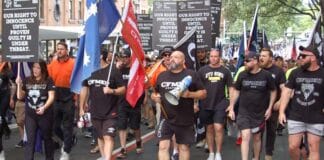CPSU members in the Department of Immigration and Border Protection (DIBP) will kick off a new wave of industrial action across the Australian Public Service (APS) starting Friday 12 August.
Staff at international airports will strike for 24 hours, supported by those in the Department of Agriculture (many working at airports) who will hold one hour stop work meetings. The Maritime Unit will hold rolling stoppages.
From 15 August, there will be rolling strikes at airports and workplaces in the Department of Human Services (Centrelink, Medicare, Child Support).
It won’t stop there. Other public servants will join in, with members meetings in Tax and other agencies at end of August, culminating in a major APS-wide strike on 9 September, including rallies.
The union is continuing a campaign that started more than two years ago for decent wages and conditions across the APS. More than 75 per cent of APS staff, more than 100,000 workers, have not had a pay rise for more than three years.
Our conditions remain under threat from Malcolm Turnbull and Public Service Minister Michaelia Cash whose policy demands loss of working conditions for below-inflation pay rises.
The government refuses to seriously negotiate over new EBAs. Instead the last two years saw farcical “bargaining meetings” with managers hamstrung by the government policy on what they can offer staff. Cash has met only once with the union.
There won’t be any genuine negotiations unless effective industrial action forces the government to listen and respond. The upcoming action needs to continue until mass meetings decide next steps.
Union strategy
The union leadership has a three-pronged approach. Industrial action will accompany a hearing in the Fair Work Commission which will seek to force the government to adhere to “good faith bargaining” rules.
According to CPSU National Secretary Nadine Flood, breaches by the government include, “the Minister refusing to meet with the CPSU, misrepresenting the union’s position and engaging in capricious conduct that undermines collective bargaining.”
But the good faith bargaining rules are weak, and only require employers to, for instance, meet the union and respond to proposals. They do not require the employer to make a reasonable offer or agree to any union proposals.
Secondly, she said: “Where bad agreements are put to staff, our members will continue asking all their co-workers to keep voting them down.” Unprecedented ballot outcomes of nearly 90 per cent “no” have sent a clear message that union members have the support of non-unionists (most agencies have only around 30 per cent union density.)
Finally, the union will continue to, “take the campaign in to the electorates … to keep the pressure on the Government to fix this mess … and holding MPs and Senators to account on supporting public services and the people who provide them.”
The renewed union campaign is causing much discussion and enthusiasm. The union in the ABS for Interviewers will produce a regular monthly newsletter to inform home-based members. Workers at the Bureau of Meteorology are planning to take photos at their workplace of solidarity messages to the DIBP strikers.
Last time strikes were held at airports the government successfully applied for an injunction stopping the action “in the national interest”. These injunctions need to be defied if they are imposed again, or at least met with protest by workers across the ABS.
Delegates and activists must be involved in planning and leading action, so that we build up confidence and organisation. Some delegates in Victoria have called for combined agency delegates meetings and mass meetings to prepare for and plan industrial action.
However, the union still shies away from involving members in this way, with the top officials simply directing the action.
The union argues that members will not show up to meetings. But the only mass meeting we’ve had, over a year ago, was an incredible success, the high point of the campaign. And without meetings the union will never built up the larger activist base it needs.
Less than half of public servants are in the union. But voting in the ballots on agreements shows that the union can influence other workers and lead beyond the membership.
When we have strike days we need to hold pickets at the front of buildings to discourage non-members from working and encourage them to join the union.
As CPSU National Secretary Nadine Flood said: “The Turnbull Government’s attack on public services such as Medicare nearly cost it the election. It’s well and truly past time for the Prime Minister and Minister Cash to rethink their harsh and unreasonable industrial war on the people delivering these and other services.”
The union understands the weak situation of the government. Now is the time to pull out all stops for industrial action.
By CPSU delegates, Melbourne





